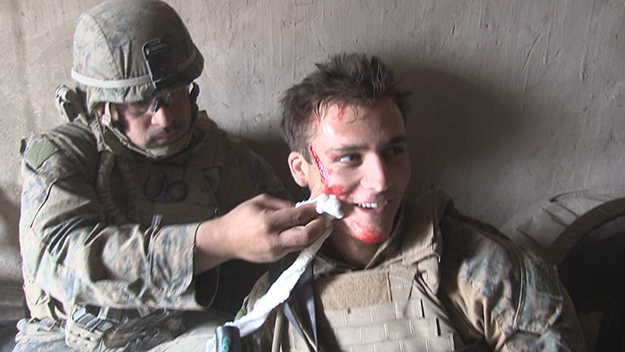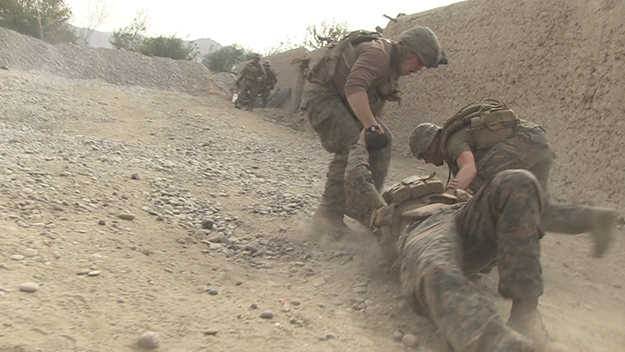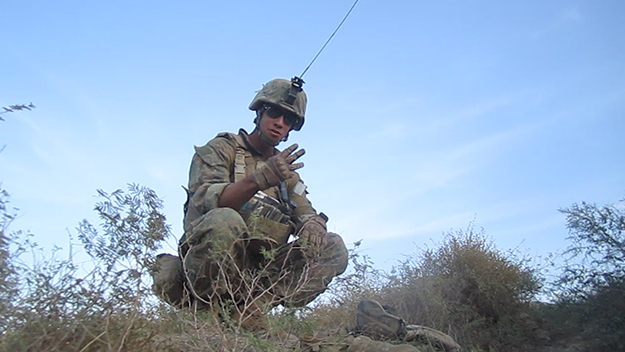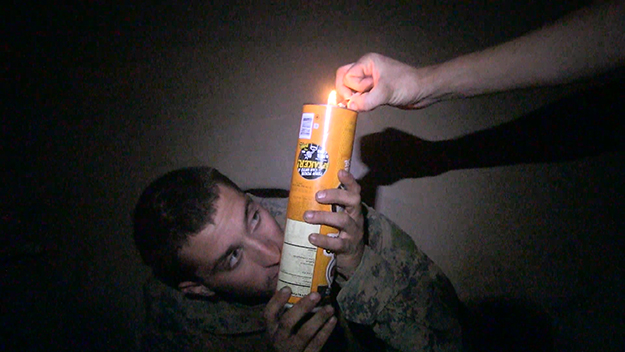Film of the Week: Combat Obscura

Even in the harshest, most unembellished documentary, you may find the occasional accidental moment of poetry. There’s one such moment in Miles Lagoze’s Combat Obscura, which he shot as a combat cameraman serving as Lance-Corporal in the Marine Corps in Kajaki, Afghanistan, in 2011-12. At one moment, in the heat of action, the camera appears to have been laid down on dusty, parched earth; an out-of-focus object, possibly a boot, fills most of the frame. Then the object is removed, giving us a sharply focused close-up of a patch of soil, with blades of grass sparsely growing out of it. This stray instance of austere beauty seems to have found its way into the film at random, with no significance other than its offering a moment of calm, with little obvious relevance to the primary purpose of the footage, which is to record the daily actions of Marines in the field. Then suddenly a blast is heard from a shelling in the background, and a cloud of dust blows over the grass.
It’s one of the few obviously rhetorical passages where Combat Obscura uses its imagery—captured on the hoof, much of it in the heat of battle—to any kind of poetic effect. Indeed, such moments are sometimes pressed into the service of a rather bleak satire. After we witness the solemn ceremonies following a Marine’s death in action, Lagoze cuts to a flight of birds over a field—then with bitter abruptness, perhaps in keeping with a special military brand of gallows humor, cuts again to a single scrawny fowl running for its life before clumsily being hacked up in a flurry of soldiers’ hatchets and flailing wings.
For the most part, Combat Obscura doesn’t go all out to provide overtly resonant images. Presumably, Lagoze and the other personnel who shot this (he and Justin Loya are the credited DPs) had plenty to occupy them besides looking for pointed visual metaphors—like survival and fending off boredom, as well as doing the basic job of reportage they were assigned to. He’s not interested in spinning a narrative, either. The hour-long Combat Obscura presents itself as a “just-the-facts” documentary from the very start—although its opening titles make it very clear that Lagoze’s facts and the official version are not quite the same. He and other Marines camera personnel, a caption tells us, “filmed what they [i.e., the Department of Defense] wanted, but then we kept shooting.” Back in civilian life, studying film at Columbia, Lagoze reviewed the footage he’d shot and decided to assemble it as a feature.

In that sense, this remarkable film comes across as war’s backstage story—it’s about the stuff they leave out of the official coverage, represented here by the extract from a CNN news item using Lagoze’s footage. What Lagoze and editor Eric Schuman don’t excise is the stuff that’s ostensibly not for public consumption: Combat Obscura is an unexpurgated “Making Of” of the Afghan campaign.
Certain moments suggest a droll but bleak blooper reel. One Marine is being interviewed on camera and another ruins the take by sitting right next to him (“Get the fuck out of my shot”). An officer robotically babbles an impenetrable, script-learned explanation of his company’s mission, and an off-camera Lagoze (or colleague) wearily says, “Can you put it in your own words?” A soldier uses a racist epithet for the Afghans, and we hear a disbelieving American voice off-screen: “You’re not recording that, are you?”
The recording doesn’t stop Lagoze’s comrades in the 1st Battalion, 6th Marine Regiment saying what they really feel. “Afghanistan is a beautiful country, there’s flowers and running water, fucking beautiful people,” says one man, then, without drawing breath, “This whole country smells like shit and I hate it.” Lagoze not only records it all, he puts it on public record here, in a manner that’s dispassionate and seemingly objective. There’s little in the film that anyone who’s seen an American war movie of the last three decades—documentary or fiction—would be surprised by. Even so, Combat Obscura surely qualifies as a substantial act of whistle-blowing (Lagoze did face investigation by the Marine Corps before the film’s release, but his problems there were reportedly resolved).
The Marines we meet are mainly revealed as vulnerable, bored, confused—and sometimes angry and callous, although that seems an inevitable side effect of the toxic mix of monotony and danger that comes with their service. Much dope is smoked on camera, one man expressing his disapproval, but the one thing that seems to keep many of them sane is the fact that, as one man says, “Luckily for us, Afghanistan is a hash farm.” (Some faces, both in the smoking and the battle sequences, are digitally blurred to preserve anonymity.)
The truth about war, and how it feels if it’s a daily job, emerges in moments of boredom and fatigue. “I want to shoot somebody,” says a Marine in a numbed tone; another, raging with frustration, yells, “I want to fuck!” in a scene where men argue like schoolboys about who gets the next turn with a porn mag. There are attempts at bravado: a guy in dark glasses, with a beer and a cigarette, comments, “Firefights are the greatest adrenaline rush ever. It’s better than skydiving.” We can believe him or not, but either way it rings hollow in view of the reality; clearly closer to the lucid truth is a man who’s just received shrapnel in his head, and sits exhausted on the ground: “I don’t think I want any more combat. I’m good after this.” Asked how he feels, he admits he’s scared, and shocked to have been hit in the Marines’ own compound. The attack came from a—he pauses—“…grenade launcher? I’m a cameraman, I don’t know what that shit’s called.”
There’s a degree of inbuilt self-consciousness: a cameraman (Lagoze himself?) comments, “I’m becoming like a combat junkie. If I don’t film combat, I feel like the patrol’s worthless.” One cameraman talks about the disconnect that happens when a casualty looks right into the camera: “It’s almost like it’s not happening. It’s like a movie.” At moments, you suspect that some of the subjects are behaving the way they think they’re meant to behave in a war movie. In the most shocking episode, Marines surround the dead body of an Afghan man lying on the ground. “Just like a deer,” someone says. They realize he’s unarmed—“Oh man, we’ve killed a shopkeeper,” someone says—but there’s no room for sentiment or even basic respect. One man leans in and addresses the corpse: “Hiya buddy, how are you today? Looks like you got fucked.”

Strutting in the face of death is one way to protect yourself against the horror, especially if you’ve been dealing it out. War is no place for “customs and courtesies,” as an officer puts it. An entire village has gathered at the mosque to honor the previous day’s dead, but the battalion carries out an inspection nevertheless, because a “high value individual”—a key Taliban figure—is reputedly on-site. The Afghans are hauled out regardless of decorum—“Get your fuckin’ ass down”—and the Marines have the conversations they shouldn’t be having on camera. One man curses the SEAL who shot Osama bin Laden when he should have been squeezed for every bit of information he could yield; another replies, with an implied shrug in his voice, “Well, we can’t really torture people.” But there is no “high value individual” on-site, and the battalion withdraws wearily after a long, futile day that presumably has done no small damage to cordial relations. All the Marines can do is joke and try to bolster their sanity as they trudge, glazed, through their tour.
The combat sequences here make you think again about that much-vaunted notion, “immersive” cinema: nothing’s more immersive than action being shot by someone who you know could be maimed or killed at any moment. The footage of shellings and firefights are intensely kinetic, not least because it feels as if the sound has been enhanced for maximum impact. There’s one moment in these sequences when you’re really struck by the physicality of what you’re seeing, but in a different way: it’s a shot of men running, with the camera behind them at ass height, and you realize how much stuff they’re hauling with them in the form of backpacks, cans, kit hanging off their backs. You get a powerful, wearying sense of the weight of war.
A classic criticism of fiction movies about America at war, from Vietnam stories on, is that they’re self-regarding: they might give us the truth about what U.S. combatants are feeling and experiencing, but they also create the impression that these wars are only about the Americans who fight them. It’s inevitable that a documentary shot by a Marine will be embedded among his own camp, and that the Afghans will be somewhere else, either as a faceless presence in the distance—like the target that the battalion tries to hit in the hills across a plain—or close at hand but depersonalized, controlled by being made other.

Here, the experience of the people of Kajaki is caught only in glimpses, but there’s no escaping it: an elderly woman wailing in a doorway, the cries of a child wounded after playing with a grenade. One of the film’s most telling moments is seen from far off and needs no comment: after an officer has talked about “building the relationship with the locals,” Lagoze cuts to an Afghan man standing at a distance, rifles trained on him, being made to undress for a search. His dignity is violated by the guns, yet respected by the camera, staying at a long remove (Lagoze could presumably have chosen to zoom in much closer).
Disconcertingly, Combat Obscura doesn’t personalize its servicemen. We may see the same people over and over, but Lagoze doesn’t invite us to get to know the battalion members: we don’t get used to their faces, or names, or characters. Instead, they register as a collective of almost interchangeable figures in fatigues, faces sometimes obscured by helmets and dark glasses. We don’t know them as individuals any more than they seem able to differentiate the people of the village they’ve occupied. During the search for the “high value individual,” one soldier looks at the assembled Afghan men and comments, “I’m jaded. I think these guys are just hanging out… But when we kill ’em, we see the same guys in the same clothes. Who knows?”
Who knows, indeed? This is a clear illustration of the famous “fog of war”—the fog not just obscuring but dulling, narcotizing. Whatever else is lost in the fog, identity—the sense of the individual self, and the dignity that should attend it—is one of the first casualties here, on both sides.
Jonathan Romney is a contributing editor to Film Comment and writes its Film of the Week column. He is a member of the London Film Critics Circle.







